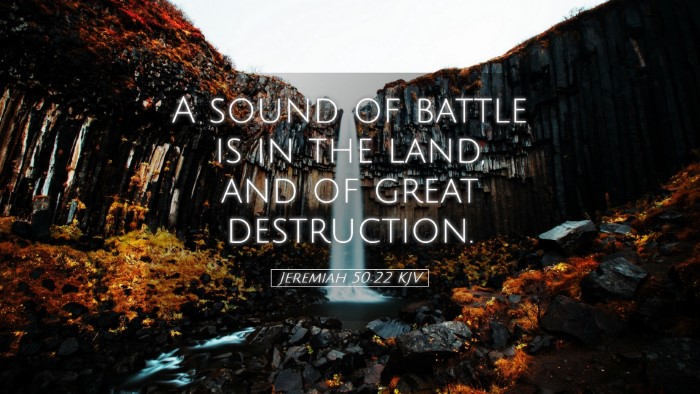Commentary on Jeremiah 50:22
Text of Jeremiah 50:22: "A sound of battle is in the land, and of great destruction."
Introduction
This verse from the prophecies of Jeremiah is nestled within the broader context of God's judgment against Babylon, symbolizing the inevitable downfall of nations that oppose His will. The "sound of battle" signifies the turmoil and chaos that accompanies divine judgment, a theme prevalent throughout the prophetic literature.
Historical Context
The historical context of Jeremiah's prophecies is crucial. This period marks the Babylonian empire's dominance over Israel and its neighbors, with the people of God caught in a complex web of political and spiritual turmoil. Jeremiah, known as the Weeping Prophet, communicates a message of both impending destruction and eventual hope for restoration.
Jeremiah's Mission
Jeremiah's role as a prophet involved warning the Israelites of their sinful ways and the consequences of turning away from God. His messages often contained vivid imagery and stark warnings about the coming judgment upon Babylon, a nation that had become synonymous with oppression and idolatry.
Verse Analysis
Analyzing the phrase "A sound of battle is in the land," we understand it as a prophetic utterance heralding the surging chaos of war. Both Matthew Henry and Albert Barnes emphasize that this battle sound signifies conflict not only among earthly nations but also reflects the spiritual battle between good and evil.
Sound of Battle
- Matthew Henry: He notes that the "sound of battle" indicates a judgment that would resonate through the land, emphasizing the noise, destruction, and calamity that sin brings, demonstrating God's righteous response to human rebellion.
- Albert Barnes: Barnes suggests that this sound serves as a metaphor for the consequences of sin, resonating with the very essence of divine justice. He notes it reflects intense spiritual upheaval.
Great Destruction
The supplementary phrase "and of great destruction" expands upon the severity of the impending judgment. According to Adam Clarke, this suggests more than mere physical devastation; it involves the ruin of spiritual integrity and societal structures.
- Adam Clarke: Clarke expounds that the "great destruction" foretells not just the Babylonian demise but foreshadows a wider spiritual collapse resulting from turning away from God.
- Application: For pastors and theologians, this destruction can serve as a somber reminder of the effects of sin, both personally and communally.
Theological Implications
As we engage with Jeremiah 50:22, several theological implications emerge. The sound of battle and ensuing destruction challenge contemporary understandings of God's justice, mercy, and the nature of divine retribution.
God's Justice
This verse underscores the concept of divine justice—a key characteristic of God's nature. Throughout scriptures, God's judgments often serve a dual purpose: punishment for evil and a call to repentance.
- Repentance: The call for societal and personal repentance is central; without returning to God, the cycle of destruction remains unbroken.
Spiritual Warfare
A broader interpretation of the "sound of battle" invokes the theme of spiritual warfare. The apostle Paul agrees with this perspective in Ephesians 6:12, where he speaks about the struggle against spiritual forces of evil.
Practical Applications
For pastors, students, and scholars, Jeremiah 50:22 provides rich material for reflection and application.
- The Role of Prophecy: Understanding how these ancient prophecies can inform modern preaching and teaching. The warnings still echo today; addressing themes of sin, repentance, and divine justice is vital.
- Comprehensive Understanding: Incorporating insights from various commentaries enriches the interpretation. Recognizing the multifaceted layers in such verses strengthens theological discourse.
- Spiritual Vigilance: Encouraging congregations to remain vigilant against societal influences that lead away from God’s truth.
Conclusion
Jeremiah 50:22 is not merely a historical statement but a living word that speaks volumes today. It is a powerful reminder of the consequences of the nation's disobedience to God and an exhortation toward diligent seeking of His ways. The resonating "sound of battle" invites church leaders to reflect on their calling to warn, teach, and guide their communities amid the clamor of modern life. As we understand this verse in its entirety, we are reminded of God's righteousness, justice, and the enduring hope for redemption that persists even in the face of destruction.


